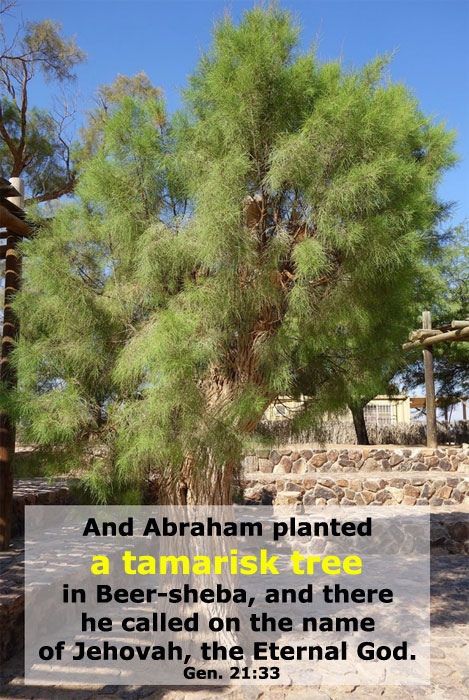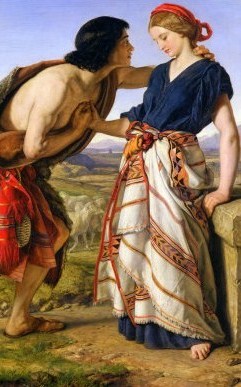
So by now Moses had his personal life with God straightened out, and both sons most likely had been circumcised (remember we think there is a possibility that the youngest son was not quite
eight days old when God got mad about the first son not being circumcised, so
probably he was circumcised shortly after that incident.)
It seemed that Moses must have gone back to Midian, taking Zipporah and the boys back home for awhile. They needed to heal and would not be able to make the long journey to Egypt until they recovered from the circumscism. Moses would need to go without them. They could join him later.
God still had to deal with the fact that Moses was not wanting to be the speaker for him with Pharaoh. Moses must have gone to Mt. Horeb to discuss this with God up on the Holy Ground where he had seen the burning bush. We know that Moses was there because that is where Aaron found him when he sought him out because God had commissioned him to do so. Possibly Jethro told Aaron where to look? We are not certain how this transpired, but the two long lost brothers did meet on the Mountain of God.
So much of this reminds me of the relationship today of the Christians and Jews. When will they find out they are REAL brothers? When will one believe another? It seems a lot of miracles take place up on The Mountain of God. It will be like watching Moses and Aaron when this finally happens and the family is reunited. Well - on with the current story.....
It seemed that Moses must have gone back to Midian, taking Zipporah and the boys back home for awhile. They needed to heal and would not be able to make the long journey to Egypt until they recovered from the circumscism. Moses would need to go without them. They could join him later.
God still had to deal with the fact that Moses was not wanting to be the speaker for him with Pharaoh. Moses must have gone to Mt. Horeb to discuss this with God up on the Holy Ground where he had seen the burning bush. We know that Moses was there because that is where Aaron found him when he sought him out because God had commissioned him to do so. Possibly Jethro told Aaron where to look? We are not certain how this transpired, but the two long lost brothers did meet on the Mountain of God.
So much of this reminds me of the relationship today of the Christians and Jews. When will they find out they are REAL brothers? When will one believe another? It seems a lot of miracles take place up on The Mountain of God. It will be like watching Moses and Aaron when this finally happens and the family is reunited. Well - on with the current story.....
The LORD said to Aaron, “Go into the wilderness to meet
Moses.” So Aaron went to meet Moses at The Mountain of God.
It had been forty years since Moses had seen Aaron. Aaron had been a slave and Moses had been a Prince of Pharaoh. They probably had never accomplished that natural closeness that most brothers are able to develop. They knew each other; but they didn't KNOW each other.
Now that Moses understood that Aaron was his real brother, God brought the two together out in the wilderness on top of His mountain and then God began to instruct them on their mission. The scriptures indicate that the brothers embraced. The word used in the scriptures is "kiss," and it indicates that God was a part of this scene as well as the brothers. God must have quickly repaired their relationship and brought them to the point of brotherly love. It was customary for those cultures when meeting close friends and relatives to embrace and kiss both sides of the face.
Moses explained to Aaron everything the LORD had been saying to him. Perhaps that is why they went up to Mt. Horeb, so that Moses could show Aaron where he had this amazing experience with the burning bush. Moses explained all the signs and the things that God had commanded for him and Aaron to say to Pharaoh and the two headed off for Egypt together.
It had been forty years since Moses had seen Aaron. Aaron had been a slave and Moses had been a Prince of Pharaoh. They probably had never accomplished that natural closeness that most brothers are able to develop. They knew each other; but they didn't KNOW each other.
Now that Moses understood that Aaron was his real brother, God brought the two together out in the wilderness on top of His mountain and then God began to instruct them on their mission. The scriptures indicate that the brothers embraced. The word used in the scriptures is "kiss," and it indicates that God was a part of this scene as well as the brothers. God must have quickly repaired their relationship and brought them to the point of brotherly love. It was customary for those cultures when meeting close friends and relatives to embrace and kiss both sides of the face.
Moses explained to Aaron everything the LORD had been saying to him. Perhaps that is why they went up to Mt. Horeb, so that Moses could show Aaron where he had this amazing experience with the burning bush. Moses explained all the signs and the things that God had commanded for him and Aaron to say to Pharaoh and the two headed off for Egypt together.
When they arrived, Aaron gathered all of the elders of the Israelites and told
them everything the LORD had said to Moses. They performed the signs before the people and
the people believed. The people were so
relieved to hear that God was concerned for them and their misery! They
bowed down and worshiped God.
So with the backing of the people of Israel, Moses and Aaron
went before Pharaoh and said: “This is
what the LORD, the God of Israel, says: ‘Let
my people go, so that they may hold a festival to me in the wilderness.’”
Pharaoh said, “Who is the LORD, that I should obey him and let Israel go? I do not know the LORD
and I will not let Israel go.”
Moses and Aaron told Pharaoh: “The God of the Hebrews has met with us. Now let us take a three-day journey into the
wilderness to offer sacrifices to the LORD our God, or He may strike us with
plagues or with the sword.”
The request to take a three day journey into the wilderness to offer sacrifices to God is such a foreshadowing of the time when Jesus Christ was sacrificed for our sins and spent three days and three nights in the grave. God was setting this pattern in motion with his people way back in the days of Moses speaking to Pharaoh. Moses points out that without this journey there would be plagues or death by the sword, and this is what our salvation redeems us from. Moses was so hopeful of redeeming the Children of Israel. Pharaoh, however, was not in a listening mood.
God's anger was the least of Pharaoh's concerns. Pharaoh was disturbed that Moses and Aaron were taking the people away from their labor. He told them all to get back to work. He was angry with Moses and Aaron. He gave orders to his slave drivers and overseers to no longer supply the people with straw for making bricks; but they had to go and gather their own straw, making their work much harder.
This is so typical to what happens to someone desiring to worship God with all of their heart. Satan is not concerned; except for his own causes. He does all kinds of things to prevent this time alone with God from happening. He might remove the essentials for survival, such as happened to the Israelites with Pharaoh's taskmasters. He will do anything to make it hard for you to be totally dedicated to worshiping The One True God.
Even though The Children of Israel had more work added on, they were required to make the same number of bricks as before. This meant longer, even harder days of unreasonable labor without rest. Pharaoh declared them to be lazy and claimed they were making excuses not to work by crying out through Moses and Aaron. He called them liars and told his overseers to pay no attention to them if they cried out. The slave drivers complied to Pharaoh’s demands. When the people did not make their quota of bricks they beat them. When the people complained to Pharaoh he just called them lazy and said they wanted to get out of their work and that was why they were saying they needed to go out to the wilderness to worship their God.
The request to take a three day journey into the wilderness to offer sacrifices to God is such a foreshadowing of the time when Jesus Christ was sacrificed for our sins and spent three days and three nights in the grave. God was setting this pattern in motion with his people way back in the days of Moses speaking to Pharaoh. Moses points out that without this journey there would be plagues or death by the sword, and this is what our salvation redeems us from. Moses was so hopeful of redeeming the Children of Israel. Pharaoh, however, was not in a listening mood.
God's anger was the least of Pharaoh's concerns. Pharaoh was disturbed that Moses and Aaron were taking the people away from their labor. He told them all to get back to work. He was angry with Moses and Aaron. He gave orders to his slave drivers and overseers to no longer supply the people with straw for making bricks; but they had to go and gather their own straw, making their work much harder.
This is so typical to what happens to someone desiring to worship God with all of their heart. Satan is not concerned; except for his own causes. He does all kinds of things to prevent this time alone with God from happening. He might remove the essentials for survival, such as happened to the Israelites with Pharaoh's taskmasters. He will do anything to make it hard for you to be totally dedicated to worshiping The One True God.
Even though The Children of Israel had more work added on, they were required to make the same number of bricks as before. This meant longer, even harder days of unreasonable labor without rest. Pharaoh declared them to be lazy and claimed they were making excuses not to work by crying out through Moses and Aaron. He called them liars and told his overseers to pay no attention to them if they cried out. The slave drivers complied to Pharaoh’s demands. When the people did not make their quota of bricks they beat them. When the people complained to Pharaoh he just called them lazy and said they wanted to get out of their work and that was why they were saying they needed to go out to the wilderness to worship their God.
When Pharaoh would not relent and The Children of Israel saw they now had
twice as much work to contend with; they were angry with Moses and Aaron. They complained to them that their suggestions had made
Pharaoh even harder on them than before, and now they had lost any favor that
they might have gained with working hard for Pharaoh in the past. They were angry and frustrated! Their faith began to crumble. They told Moses and Aaron “May the LORD look upon you and judge you!”
So Moses went back to talk to God. He had one question: “Why?”
Why God? Why have you brought judgment on these people instead of
deliverance? Why did you ask me to go
and cause all of this trouble for them?
Now Moses was homeless, without any friends, tired and worn
out and missing his family in Midian. His mission now looked like a complete
failure. All he could do was
sit with his questions for God as the people suffered more and more.
What does one do if they have been obedient to God and things go south anyway?
Should one be patient and keep trusting in spite of the horrible circumstances?
What does one do if they have been obedient to God and things go south anyway?
Should one be patient and keep trusting in spite of the horrible circumstances?
Sometimes it always looks darkest just before the dawn.

.jpg)
.jpg)










.jpg)
.jpg)
